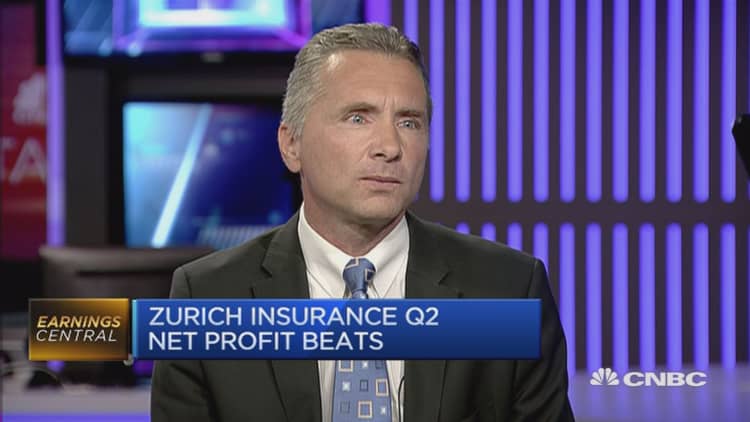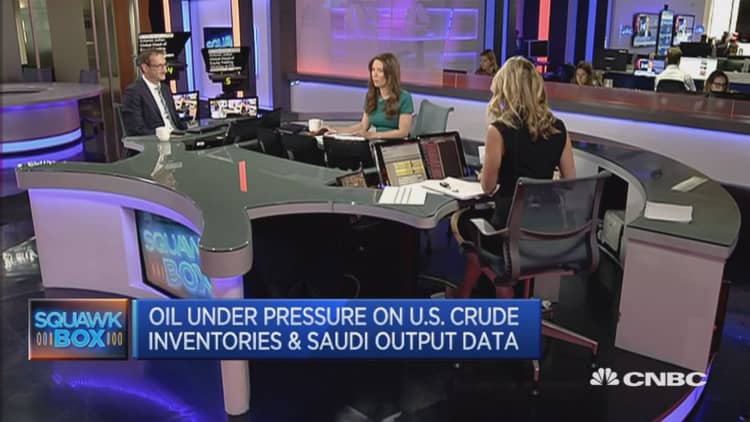



Anxious fixed income investors were given a little more to chew on Thursday morning with new research that detailed what could cause a significant sell-off in the U.S. Treasury market.
"The question remains .. what set of macro risks could trigger a bond market sell-off?," global strategists at UBS, led by Chirag Mirani, asked in a note released Thursday morning.
Sovereign bonds - and their relative valuations - have been a hot topic this month amid a seemingly never-ending uptick in prices, the launch of a major quantitative easing program in the U.K. and a shift to more fiscal planning by the Japanese government.
Treasurys
The global amount of negative-yielding government bonds now stands at $11.4 trillion, Fitch Ratings said on Wednesday. Nonetheless, bond investors are once again questioning whether yields - which have an inverse relationship to the price - can go lower still, or whether we'll see a snapback as inflation begins to rise again.
The Swiss bank, using historical analysis and the dynamics of the current market for sovereign debt, indicates that perhaps the biggest risk to the bond market is that the market pricing of the Federal Reserve rate hikes and inflation is much lower than the central bank's own expectations.
It found four scenarios that could push rates higher including higher growth and inflation expectations. It also mentions a "supply driven inflationary breakout" driven by factors such a supply bottlenecks or wage increases. The latter has been raised on the presidential campaign trail in the U.S. and major retailers such as Target and Wal-Mart have already announced an increase to wage floors.
Policy makers may become proactively hawkish, UBS also stated, and highlighted the 2013 "taper tantrum" which saw a short lived sell-off in Treasurys. Its last scenario was an expensive bond market suddenly correcting and pulling other global markets with it.
"The most expensive bond market is in Europe. There, we saw such a correction in April 2015," the note said, but conceded that all scenarios were not its base view and were unlikely in most cases.
"It did have some broad implications but it did not shake the foundation of global markets. Japan may be volatile if (the Bank of Japan) decides to move away from (its negative interest rate policy). That said, again, in the long run in the absence of inflation and growth, spikes are hard to be sustained," it added.
Since the global financial crash of 2008, central bank policy has focused on buying up bonds in large quantities -- which directly benefits the fixed income market. However, more fiscal planning by governments - as seen by Japan last week and hinted at by the U.K. finance minister - is expected to lead investors towards inflation hedges like equities instead of fixed income which is seen as a safe haven.
However, a £60 billion ($78 billion) stimulus program by the Bank of England suffered an embarrassing shortfall on Tuesday as bondholders refused to sell up. This caused yields to actually fall lower with the central bank expected to have to pay a higher premium on its future purchases.
Bryn Jones, head of fixed income at Rathbones, believes central banks have flattened interest rates and created problems for fixed income investors. "The chase for yield is on," he told CNBC Thursday.
While some market-watchers might still be buying, others are incredulous at how bond yields can dip even lower. Stephen Isaacs, the chairman of the investment committee at Alvine Capital and former director of fixed income trading and syndication at Credit Suisse, believes that fixed income has absolutely no value.
"I think monetary policy is a dead duck and I think bond yields at this level for investors represent absolutely no value and a huge amount of risk. What I would like to focus on is the coming fiscal reflationary trade because I think that is creeping out of the woodwork in many places," he told CNBC Wednesday.
"I would sell all the gilts I had to the Bank of England," he added.


